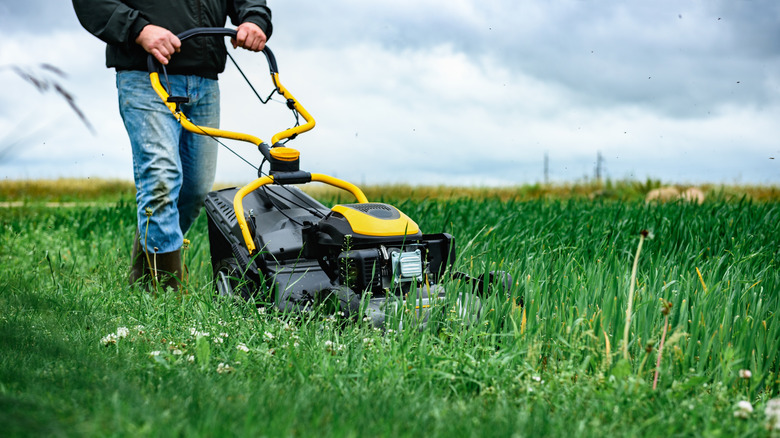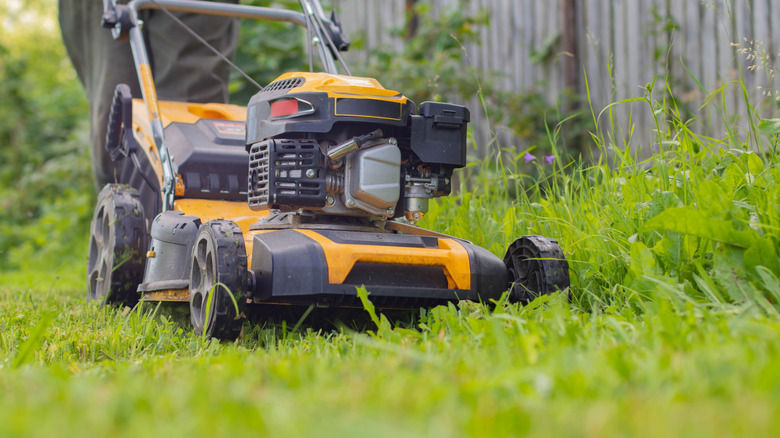Prevent Lawn Mower Fires With These Essential Maintenance Tips
It doesn't take a raging wildfire to cause devastation in a backyard. A task as routine as mowing the lawn can turn dangerous if your equipment isn't cared for. Across the country, there have been cases where a lawn mower caught fire, and the blaze spread quickly through the property.
The same machine that keeps yards neat combines fuel, heat, and fast-moving blades in close proximity to dry vegetation. Left unchecked, these are the perfect conditions for a fire. But, unlike random accidents, these fires almost always trace back to preventable causes, including gas leaks, flammable buildup on the mower, and short cooling times before storage. Thankfully, you can avoid fire incidents by maintaining the device well and following some lawn mower safety tips. These include clearing away grass clippings that can smother the engine, checking for fuel leaks before each use, and giving the mower time to cool before tucking it into the shed.
Maintenance tips to prevent lawn mower fires
One of the most effective lawn mower maintenance tasks is clearing away grass clippings. When mower blades cut through tall grass, the clippings don't always settle harmlessly on the ground. Some get pulled into the deck and blown upward onto the muffler. Now, the muffler is one of the hottest parts of the mower, and dry grass resting on it can smolder within minutes. Make sure you keep the underside of the deck clean and free of buildup. This eliminates that fuel source before it has the chance to ignite.
Cooling the engine is just as critical. A lawn mower produces heat in several parts, and in summer, the engine temperature can rise quickly. Without time to cool, the metal remains hot enough to ignite almost anything combustible nearby. Giving the mower time to sit without power and cool properly ensures that its residual heat doesn't sets something else alight.
Finally, a quick check for leaks before you start the engine can mean the difference between an ordinary Saturday chore and a call to the fire department. That's because gasoline is notoriously volatile, and its vapors ignite well below the temperature of an operating engine. Even a minor leak on the motor can start an instant fire; vapors around a hot muffler can spark flames, too.
Added safety measures to reduce the risk of lawn mower fires
Shrubs, trees, and groundcovers rich in waxes and oils, like arborvitae, fountain grass, and rosemary, burn quickly. That's why fire officials recommend replacing them with less flammable options in areas where you mow. Some fire-resistant plants include rockcress, mahala mat, ice plant, creeping thyme, and Japanese pachysandra (the latter is invasive in several eastern states, so check for its invasive status where you live before planting).
What you spread on the ground matters, too. Mulches made from wood chips may look neat, but they're more likely to burn — especially if they end up in an overheated mower. Crushed gravel or stone, on the other hand, offers a fire-resistant alternative that doubles as a durable landscaping choice.
Further, a quick walk-through of the yard before mowing goes a long way. Rock strikes could be a serious hazard. Therefore, removing rocks and other debris keeps those high-speed blades from hitting anything that could spark. The mower's steel blades can spin at nearly 200 miles per hour, and when they make contact with even a small rock, the impact can throw sparks into dry grass, creating the perfect ignition point. No wonder it's important to know what to do if you hit a rock with your lawn mower.


